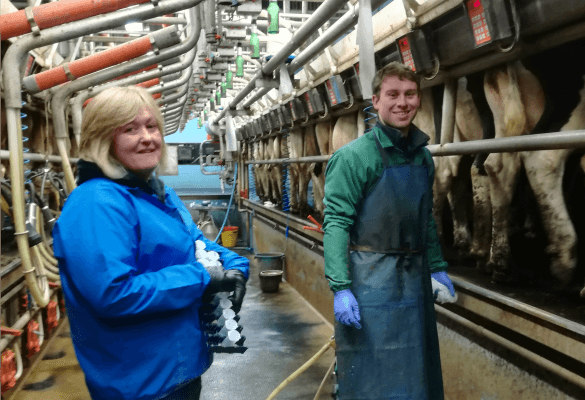
Farmer Focus: CD Whitticase & Son, Glanywern Farm, Shropshire
In the heart of Shropshire, near Oswestry, is the Glanmarton pedigree Holstein herd run by the Whitticase family.
The herd comprises of 350 milkers and 300 followers, milked twice a day averaging 10,500kg with calving switched a couple of years ago to Autumn and Winter. The Holsteins are in one group and fed a semi TMR along with summer grazing for some of the herd. David and Mary Whitticase have been CIS customers since 2013 and use the gComplete service which includes their monthly milk recording, registrations, type classification visits and genomic testing.
Also working on the 500-acre 4th generation family farm are sons Gareth and Ian, along with Ian’s finance Claire. In addition to the dairy herd, the family has 10 pedigree sheep and grow grass, maize and wheat.
CIS Area Manager Bernadette Crayston ensures a milk recorder visits the farm monthly to do the milk recording as part of their gComplete package. Samples are taken to the CIS accredited laboratory down the road in Telford and tested for lactose levels as well as butterfat, protein and SCC. Every 6 months the milk samples are tested for Johnes and other diseases if required so the family can closely monitor the health status of the herd.
Commenting on the service Ian says, “Milk recording is important and invaluable to us; it is an excellent way of monitoring our herd health and monitoring milk components after a cow has calved. Access to results within 48hrs either online through the YourHerd portal or via the Mobile Herd App is fantastic and we can make decisions immediately if required to improve individual or overall herd performance. The gComplete service is a cost-effective package for our farm with all the elements we need to measure herd performance and ultimately saves us times”.
The family also benefit from two annual Type Classifications which are undertaken when the heifers are ready to be classified. A classifier visits the farm to provide an independent assessment of animal conformation, identifying the individual animal and whole herd strengths and weaknesses. By classifying, conformational issues can be recorded, improved upon and reduced in the next generation via corrective breeding, improving the herd’s production, longevity, health and welfare, economically benefitting the farm.
In the last 12 months the family invested in a new dry cow shed to help improve transition to the milking herd and now the focus is on further improving the quality of the cows and herd performance. The volatile milk prices make it hard for the family and the industry to see what is around the corner, but they are focused on staying positive and further improving and growing their pedigree Glanmarton Holstein herd.
